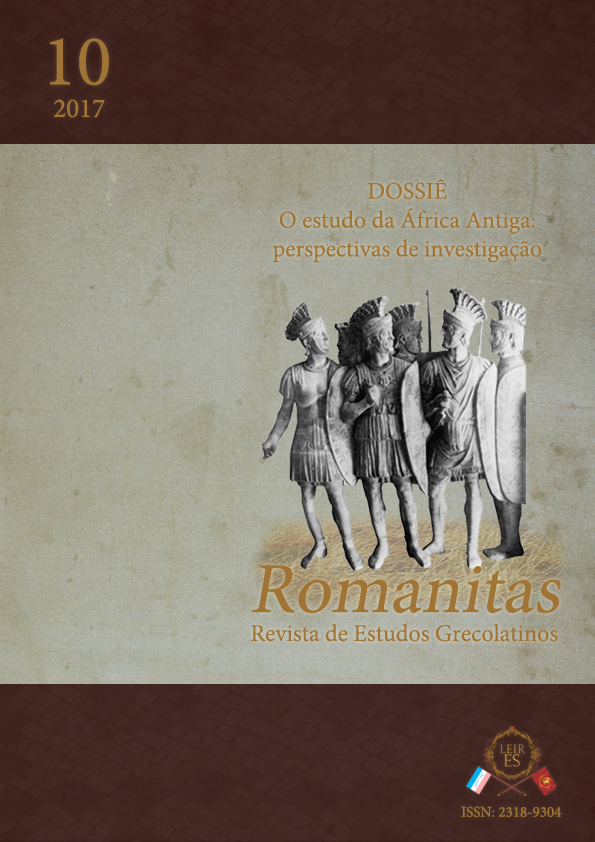Alexandria e Roma: representações, dinâmicas e vicissitudes na esfera do poder ptolomaico
DOI :
https://doi.org/10.17648/rom.v0i10.18972Mots-clés :
Alexandria, Egito, Ptolomeus, Período helenísticoRésumé
A expansão romana pelo Mediterrâneo Oriental foi um processo complexo, envolvendo diplomacia, alianças e conflitos com antigos reinos estabelecidos em uma região de enorme diversidade cultural e resultou na gradual absorção desses territórios sob o controle direto de Roma. O Egito ptolomaico foi o último grande reino helenístico conquistado e seu processo de anexação foi adiado em virtude de seu valor diferenciado para Roma, em vários aspectos. A literatura greco-romana pontua alguns momentos da vivência da dinastia ptolomaica, principalmente as ocasiões de contatos e tensões com Roma. A intenção desse artigo é avaliar como tais fontes representam a sucessão dos Ptolomeus, de forma a ressaltar o “caos” interno da dinastia, ao mesmo tempo em que justificariam a necessidade da instalação da “ordem” romana na região.Téléchargements
Références
Documentação textual
APPIAN. Roman history. Translaled by Horace White. London: Harvard University Press, 1912.
ATHENAEUS. The learned banqueters. Edited and translated by Douglas Olson. London: Harvard University Press, 2007.
CAESAR. Alexandrian war. Translated by G. Way. London: Harvard University Press, 1955.
______. Civil wars. Edited and translated by Cynthia Damon. London: Harvard University Press, 1914.
CICERO. De domo sua. De haruspicum responsis. Edited and translated by G. Nisbet. Cambridge: Harvard University Press, 1979.
______. Letters to Atticus. Edited and translated by R. Shackleton Bailey. Cambridge: Harvard University Press, 1999.
______. Letters to friends. Edited and translated by R. Shackleton Bailey. Cambridge: Harvard University Press, 2001.
______. Letters to Quintus and Brutus. Edited and translated by R. Shackleton Bailey. Cambridge: Harvard University Press, 2002.
______. On the agrarian law. Translated by J. H. Freese. Cambridge: Harvard University Press, 1984.
______. Pro Caelio. Translated by R. Gardner. Cambridge: Harvard University Press, 1970.
______. Pro Rabirio Postumo. Translated by N. H. Watts. Cambridge: Harvard University Press, 1953.
DIO CASSIUS. Roman history. Translated by Earnest Cary and Herbert B. Foster. Cambridge: Harvard University Press, 1954.
DIODORUS SICULUS. Library of history. Translated by C. H. Oldfather. Cambridge: Harvard University Press, 1932.
FLORUS. Epitome of Roman history. Edward Seymour Forster. Cambridge: Harvard University Press, 1984.
FRONTINUS. Stratagem: aqueducts of Rome. Translated and edited by C. E. Bennett and Mary B. McElwain. London: Harvard University Press, 1925.
JOSEPHUS. Jewish Antiquities. Translated by J. Trackeray. Cambridge: Harvard University Press, 1930.
LIVY. History of Rome. Translated by Frank Gardner Moore. Cambridge: Harvard University Press, 1970.
LUCAN. Pharsalia. Translated by J. D. Duff. Cambridge: Harvard University Press, 1928.
PAUSANIAS. Description of Greece. Translated by W. H. S. Jones. Cambridge: Harvard University Press, 1918.
PLUTARCH. Lives. Translated by Bernadotte Perrin. Cambridge: Harvard University Press, 1914.
STRABO. Geography. Translated by Horace Leonard Jones. Cambridge: Harvard University Press, 1960.
SUETONIUS. Lives of the Caesars. Introdution by K. R. Bradley and translated by J. C. Rolfe. Cambridge: Harvard University Press, 1997.
Obras de Apoio
BERNAND, A. Alexandrie des ptolémées. Paris: CNRS Éditions, 2001.
BIEZUNSKA-MALOWIST, I. Formes de résistance dans l’Égypte grecque et romaine et l’attitude de gouvernement. In: YUGE, T.; DOI, M. (Ed.). Forms of control and subordination in Antiquity. Tokyo: The Society for Studies on Resistance Movements in Antiquity, 1988, p. 239-245.
BOWMAN, A. K. Egypt in the Graeco-Roman world: from Ptolemaic kingdom to Roman province. In: CRAWFORD, H. (Ed.). Regime change in the Ancient Near East and Egypt: from Sargon of Agade to Saddam Hussein. Oxford: Oxford University Press, 2007, p. 165-181.
CAPPONI, L. Augustan Egypt: the creation of a Roman province. London: Routledge, 1975.
CLÍMACO, J. C. A Alexandria dos antigos: entre a polêmica e o encantamento. Tese (Doutorado em História) – Programa de Pós-Graduação em História Social, Universidade de São Paulo, São Paulo, 2013.
EMPEREUR, J. Y. Alexandria rediscovered. London: Harcover, 1998.
GOLD, B. K. Literary patronage in Greece and Rome. North Chapel Hill: University of North Carolina Press, 1987.
GUARINELLO, N. L. História Antiga. São Paulo: Contexto, 2013.
HEKSTER, O. Kings and regime change in the Roman Republic. In: SMITH, C.; YARROW, L. M. (Ed.). Imperialism, cultural politics and Polybius. Oxford: Oxford University Press, 2012, p. 184-202.
HUZAR, E. Alexandria ad Aegyptum in the Julio-Claudian Age. Aufstieg und Niedergang der Römischen Welt, v. 2, n. 10.1, p. 619-668, 1988.
LEFÈVRE, F. História do mundo grego antigo. São Paulo: Martins Fontes, 2013.
LEWIS, N. Life in Egypt under Roman rule. Oxford: Oxford University Press, 1983.
MAEHLER, H. Alexandria, the mouseion and cultural identity. In: HIRST, A.; SILK, M. (Ed.). Alexandria, real and imagined. Aldershot: Ashgate, 2004, p. 1-14.
______. Roman poets of Egypt. In: MATTHEWS, R.; ROEMER, C. (Ed.). Ancient perspectives on Egypt. London: University of London Press, 2003, p. 203-215.
ROSTOVTZEFF, M. I. Social and economic history of the Hellenistic World. Oxford: Clarendon Press, 1941.
SCHULLARD, H. H. From the Gracchi to Nero: a history of Rome 133 B.C. to A.D. 68. New York: Routledge, 1982.
WILLIAMS, K. M. A. Alexandria and the sea: maritime origins and underwater explorations. London: Sharp Books, 2004.
Téléchargements
Publiée
Numéro
Rubrique
Licence
(c) Copyright Romanitas - Revista de Estudos Grecolatinos 2018

Ce travail est disponible sous licence Creative Commons Attribution - Pas d'Utilisation Commerciale - Pas de Modification 4.0 International.
a. L’Auteur mantient les droits d’Auteur et accorde à la revue le droit de première publication.
b. L’Auteur a l’autorisation pour assumer des contrats additionnels séparément, pour distribution non exclusive de la version du travail publiée dans cette revue (ex.: publier en répertoire institutionnel ou comme chapitre de livre), avec reconnaissance de l’Auteur et publication initiale dans cette revue.
c. L’Auteur a l’autorisation et est encouragé à publier et distribuer leur travail en ligne (ex.: dans des répertoires institutionnels ou dans votre page personnelle) après la première publication par la revue, avec les créances.
d. Les textes de la revue sont publiés sous Licence CC BY 4.0 Deed Attribution 4.0 International (CC BY).

























